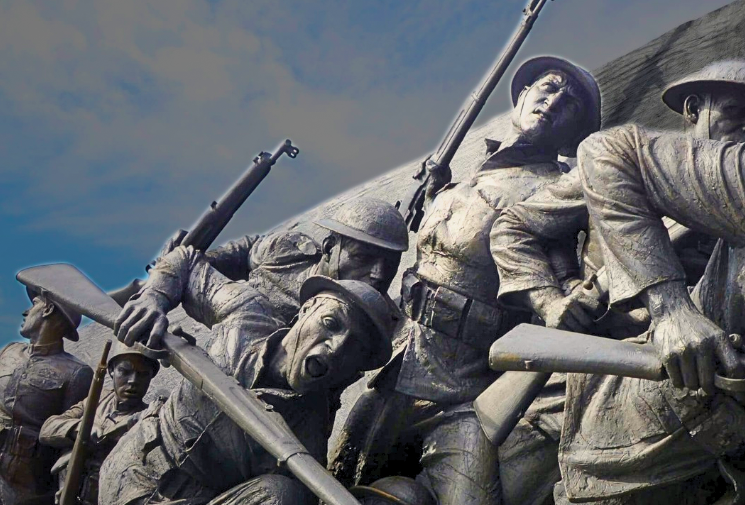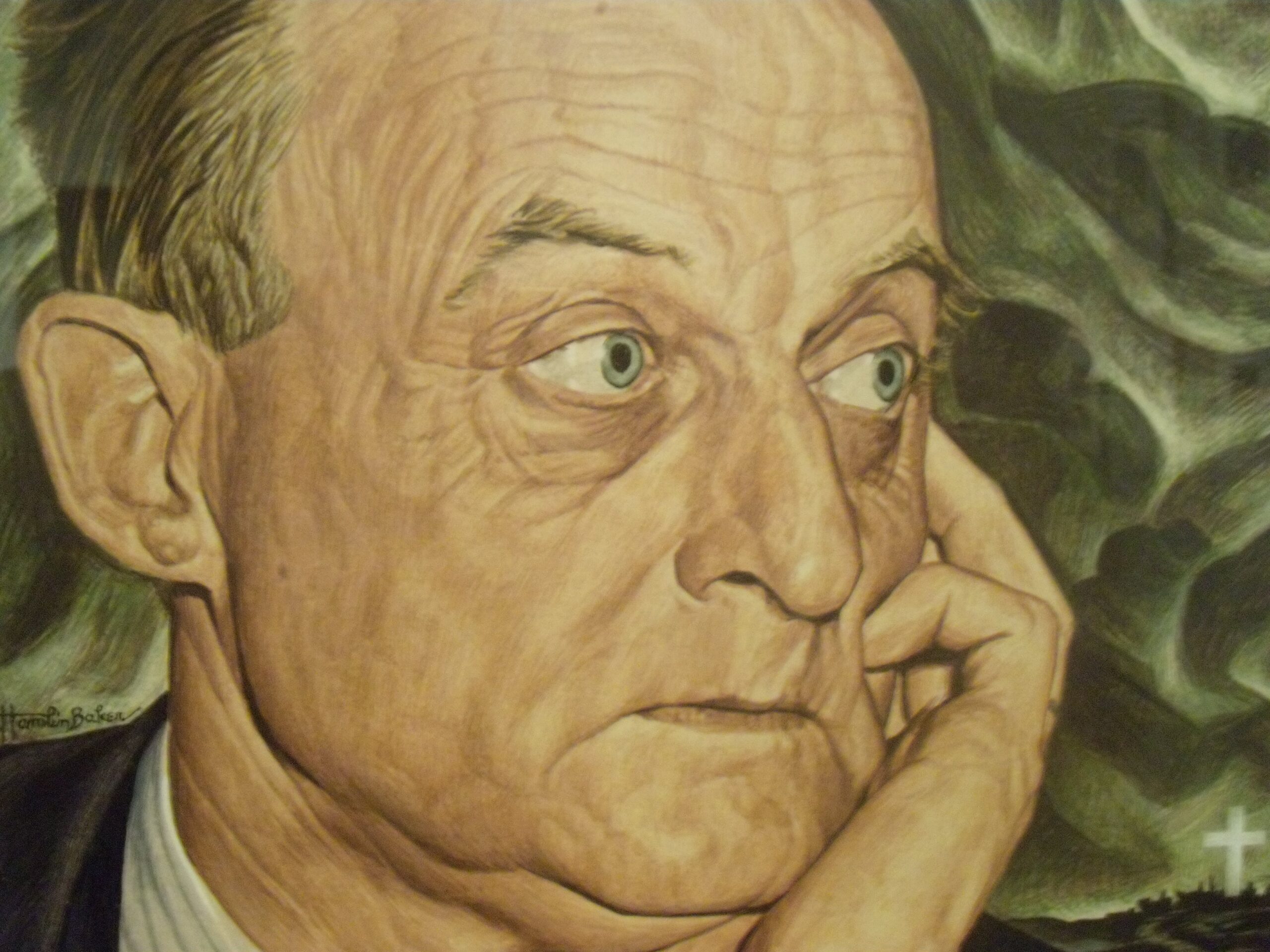Democracy and Imperialism:
Irving Babbitt and Warlike Democracies
By William S. Smith
(University of Michigan Press, 2019)
Every so often a new book provides a perspective on a well-known and much argued topic that compels readers to rethink how they view political life. William S. Smith’s Democracy and Imperialism: Irving Babbitt and Warlike Democracies is such a book. It cuts against the grain of the view, shared by liberal internationalists and neoconservatives, that democracies are inherently peaceful and that they are immune to imperial inclinations and behavior because they are born in resistance to tyranny.
Democracy, the theory goes, is the alternative to imperialism. Imperialism is the consequence of regimes that insulate rulers from the people’s will. Once democratic institutions take root, imperial inclinations disappear. Why? Because the democratic will produced by popular regimes is enlightened by the self-interest and virtue of the people, who refuse to tolerate imperialism since they suffer the consequences of imperial wars and expansion. The historical movement toward democracy, equality, and the expansion of human rights defines the movement of history itself and makes democracy providence’s own chosen regime.
Smith challenges these assumptions about democracy and imperialism by drawing on an unlikely source of wisdom about international affairs, the late nineteenth- and early twentieth-century Harvard professor of comparative literature Irving Babbitt. The crux of Smith’s argument is that democracies are inclined to imperial conduct when they are animated by romantic and humanitarian sentiments, ideas, and character. Humanitarians tend to obscure the possibilities of politics and history because they are apt to imagine them through the veil of abstraction, which exaggerates the human capacity for cooperation and embraces a myth of inevitable progress.
In Babbitt’s view, by contrast, higher virtues are only possible when ethical work prepares the way. Mere sentiment, no matter how laudatory, not only fails to provide the spiritual substance for a sound politics; it also inspires the dangerous idealism evident in disastrous efforts to better the world, like the French Revolution or the Great War. In an age that seems to have forgotten the value of the liberal arts and humanities to the conduct of practical life, Babbitt reminds us that political philosophy, history, literature, and poetry—liberal learning in general—provide perspective that is lost when politics is imagined through mere utilitarian lenses.
Smith’s analysis begins and ends with the challenges of the post–Cold War world order. It summarizes the arguments made by Francis Fukuyama and Samuel Huntington and connects each thinker to categories of political thinking developed by Babbitt. Fukuyama has much in common with Rousseauian romanticism and progressive internationalism. Huntington, by contrast, is cast by Smith as a realist who avoids the amoralism of Henry Kissinger and comes close to Babbitt’s cosmopolitan moral realism. Smith explains the common ground between Babbitt and Huntington: “In our time, Huntington points out that the challenge is even more daunting and complex: to develop a rich cosmopolitanism that unites across culturally diverse civilizations—a project for which Babbitt’s moral-religious and humanistic philosophy and his extensive discussion of East and West laid a philosophical foundation.”
The middle of the book analyzes Babbitt’s political theory and its relevance to international relations. Babbitt was a professed humanist, a term he contrasted to “humanitarian.” His New Humanism derived from the Greeks (especially Aristotle) and Romans (Cicero in particular) and included the Judeo-Christian tradition, Buddhism, Confucianism, and the modern political philosophy of Edmund Burke. Babbitt’s humanism was ecumenical and multicultural because these various traditions and thinkers identified common, universal characteristics of human nature that embraced ethical dualism: the tension in human beings between a higher and a lower will. Insofar as individuals were capable of realizing the highest aspirations of civilization, they had to first discipline their character to their higher will and refrain from following the dictates of their lower will.
In Babbitt’s humanist conception, objectives like peace and harmony required strenuous, ethical work. By contrast, humanitarians attempted to remake the world without the requisite disposition of character and will, replacing the virtue of self-restraint with the pseudo-morality of compassion. As a result, writes Smith, “humanitarianism is largely indistinguishable from imperialism.”
Smith applies Babbitt’s thesis to contemporary America and its tendency to engage in war on a nearly constant basis. Smith acknowledges that there are disagreements about the motives and objectives of particular conflicts. The larger point is that, like the ancient republics in Greece and Rome, the American republic has exhibited imperial characteristics that stem from existential or moral imperialism. Democratic institutions have not inoculated the U.S. from imperialism because its primary cause is a romantic disposition of character. Expansive will inspires expansive foreign policies; politics is the individual writ large.
Imperialism, then, is more than a political category. It reflects the failure to orient human will to moral restraint and is observed in the conduct of both dictators and humanitarians. Humanitarians prefer the language of equality, fraternity, and social justice. Yet the results are similar to dictatorship. As Smith explains Babbitt’s view: “Leaders of poor moral character who would easily cast aside conscience would be far more likely to embody a spirit of imperialism and exhibit a stronger inclination to impose their wills on others.” Such leaders are incapable of minding their own business and the business of their nation; they meddle in the affairs of other nations and the world at large because they are filled with the conceit that their intervention can only make the world a better place.
Restraint ≠ Appeasement
A likely reaction to Smith’s argument is that it leads to reflexive isolationism. When faced with circumstances that require the use of force, political leaders who follow the advice of Babbitt and Smith might avoid military conflict to the point of appeasement and functional pacifism. The consequence would be a neutered foreign policy that endangers security and vital national interests. Babbitt seems to invite such criticisms when he labels the human faculty that constitutes virtue the “inner check” and “will to refrain.”
How can political leaders prudently respond to circumstances that require the use of force if they should be guided by the inner check? This aspect of Babbitt’s thought has been greatly misunderstood. When Babbitt and Smith argue for a more restrained foreign policy, they are not arguing the point in the abstract. Rather, they account for historical instances of American use of force and conclude that, on the whole, there has been a tendency to meddle in the affairs of other nations without adequate justification. World War I and the Spanish-American War were used by Babbitt to make his points about American imperialism. Smith uses the Iraq War to the same effect.
The argument for a more restrained American foreign policy is also based on philosophical insight that is itself historically derived. What is evident from thinkers and traditions including Plato, Aristotle, Cicero, St. Augustine, Buddhism, Confucianism, and Edmund Burke is the existence of a human faculty that can be described as right reason, moral conscience, moral sense—or to use Babbitt’s language, an inner check or higher will. The exercise of this ethical will is a check or pause in the stream of desire, but the pause is not the end of the story. Some desires and appetites are consistent with the higher aspirations of civilization, such as justice, happiness, the Good, Nirvana, truth, and beauty. To realize such goods requires the use of ethical conscience to examine the circumstances and determine if desire should pass into action. In the rightly ordered soul, only those desires that are consistent with virtue and the higher ends of civilization will be permitted to pass into action. The inner check does not paralyze the will but directs it toward the Good.
Romantic and humanitarian thinkers like Jean-Jacques Rousseau tended to eliminate ethical deliberation in light of human beings’ natural goodness. Their objective is to remove conventional and moral impediments to realizing what they believe to be the good desires that humans have. When enlarged to the domain of politics, such thinking can lead to imperialism because political leaders become certain that their nation’s motives are pure and that the outcome of military intervention can only improve a bad situation. The romantic imagination that inspires humanitarian crusading in foreign affairs blinds political leaders to the possible pitfalls of their policies. The very notion that history has sides is part of the leaders’ self-deception that helps to quiet pangs of conscience that create doubts about idealistic and utopian policies.
The point is not that statesmen can never improve political life. What improvement is possible, however, is contingent on seeing life and its realistic possibilities for what they are, as opposed to believing in romantic fictions that do far more harm than good. What Burke calls the moral imagination, the ability to see life as it is and to adjust politics accordingly, is itself the product of the rightly ordered soul.
George W. Bush’s second inaugural address illustrates the romantic imagination at work. The president articulated a justification for intervention in any part of the world. “We go forward with complete confidence in the eventual triumph of freedom. . . . History has an ebb and flow of justice, but history also has a visible direction, set by liberty and the Author of Liberty.” Confident that America was on the right side of history, Bush proclaimed that the “survival of liberty in our land increasingly depends on the success of liberty in other lands. The best hope for peace in our world is the expansion of freedom in all the world.” This romantic vision of the world leads the president to his imperial policy conclusion: “So it is the policy of the United States to seek and support the growth of democratic movements and institutions in every nation and culture, with the ultimate goal of ending tyranny in our world.”
As it turned out, it might have been better to begin without complete confidence and to be more humble about the direction of history and one’s knowledge of the Author of Liberty. But why would Bush question his policies when he was so certain that his motives were pure and his goal of ending tyranny in the world so laudable? Humanitarians lack the spiritual substance to confront a world that refuses to comply with their dreams and continues to teach us lessons about the tragedy of hubris. Those who wish to make sense of the repeated failures of American foreign policy in the last century would do well to deepen their understanding of the ethical and imaginative roots of politics by reading Democracy and Imperialism: Irving Babbitt and Warlike Democracies.
Michael P. Federici is professor and chair of the Department of Political Science and International Relations at Middle Tennessee State University.
Founded in 1957 by the great Russell Kirk, Modern Age is the forum for stimulating debate and discussion of the most important ideas of concern to conservatives of all stripes. It plays a vital role in these contentious, confusing times by applying timeless principles to the specific conditions and crises of our age—to what Kirk, in the inaugural issue, called “the great moral and social and political and economic and literary questions of the hour.” Subscribe to Modern Age »













